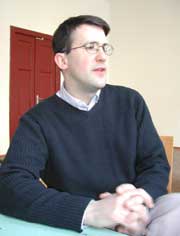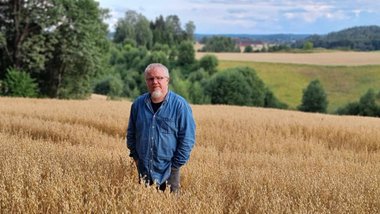Interview with David Mohline

"We both had a heart for sharing about Jesus Christ in this part of the world..."
Interview with David Mohline, Missionary from the Fellowship of Christian Students

– Please tell us about yourself and the organization you represent?
– My name is David Mohline and I am an American from Chicago and I have a wife and three children. My wife's name is Nadine and my three children are named Adrian, Elizabeth and Olesia. We have lived in Lviv for four and a half years. We represent the Fellowship of Christian Students (FCS), which is a Christian group that works with university students in Ukraine. And it's a part of an international group called International Fellowship of Evangelical Students, based in Oxford, England. It is in one hundred forty-five different countries.
– How old is the organization?
– It started after World War II as an official organization, but there were already some student organizations that formed between the two world wars. However, they only came together officially after World War II.
– What brought you to Ukraine?
– Well, certainly God. But we had always had an interest. My wife and I met in the mid-1980s and got married in 1991. However, before we got married, my wife was able to spend her junior year of university abroad in Paris and had a chance to travel through Eastern Europe right as everything was falling. She was in Berlin just a few months after the wall fell, and she had a chance to go to Hungary and other places during that spring as everything was happening. She told me about this and the stories going on there and we both had a heart for sharing about Jesus Christ in this part of the world. Then, when an opportunity presented itself about five or six years into our marriage, we took advantage of it.
– How many missionaries does FCS have in Ukraine?
– In Ukraine we have nine foreign staff and nineteen national staff.
– Which regions are they in?
– They are in all the regions of Ukraine. We break up the regions as western region (the six oblasts in western Ukraine), central (Kyiv), southern (Odesa, Mykolaiv, Kherson, Crimea), and eastern (Kharkiv, Donetsk, Luhansk). So, we have four different teams. Plus, there is a national team that does administration, division and national services.
– Is all this work on campuses?
– We direct our ministry towards university students. By that I mean academies, universities, institutes and sometime into high schools. However, in western Ukraine we don't have ministry in high schools. Most of the time our ministry is with the students who choose to be apart of our organization. We provide them with support and learning how to study God's word and how to allow God to speak to them in their personal devotions and time and just to support them in the fellowship with other students. The real ethos of FCS is that the students will be doing the ministry with students. Students will be reaching out to the students in their ministry and they'll be able to lead the bible studies and they'll be able to encourage their friends to grow in a relationship with Christ.
– When did FCS first come to Ukraine?
– Actually, the first time that Americans had come with a vision for starting something like this was in 1989, when there was a cultural exchange between Kyiv State University and Inter-Varsity Christian Fellowship in the USA. The American students from Inter-Varsity spent six weeks in Kyiv and then they all returned to the USA for six weeks there and had a cultural exchange. In fact, some of our first staff came from that exchange. So it's been a long history. But, it became an official organization in Ukraine only in 1998 or 1999.
– How would you see the future of your organization in Ukraine?
– As I said, it's really a student-led movement. The staff really tries to provide support and encouragement at the universities. We have a desire to equip students to not only be leaders at their universities and in their groups at FCS, but also after they're done with university. They will be able to be leaders not only of Ukraine but also leaders within their churches and continue to live out their lives for Christ in all areas of their life, not just in church, but also in whatever they decide to do, whether that is in the market place or full-time Christian ministry. Most who graduate from FCS go right into the market place and into business. It's not a preparation for full-time Christian service, although some of the students of FCS do wind up doing that.
– Has FCS encountered any resistance, either secular or otherwise?
– I would say that in western Ukraine for the most part we have not faced opposition, as much as it is sometimes difficult to be in the universities or dormitories. For example, in the USA if you're just a student group you are usually welcomed to be part of student life on campus, and that is something that, as of yet, is not widespread throughout Ukraine. Although we do have some institutes and universities that have invited us to take part and use facilities such as rooms. But that's the only kind of resistance. And certainly students can invite others to take part in meetings in dorm rooms or participate in events. In fact, I've been wonderfully pleased, because FCS is an Evangelical organization but we encourage students from all backgrounds to be able to participate. For example, in Lviv I would say a third of our students are Greek Catholics and among our leaders about half of them. So, it is something that spans across the different denominations and confessions of Christian faith. This is exciting because one of the things I'm really encouraged about is that when the students fellowship with each other they have to understand what brings them together in the body of Christ and that is Jesus Christ as Lord and Savior, and not all the things that can divide us. It is exciting to have those people go back to their churches and be able to bring that gift of unity to their respective churches.
– How do Ukrainians respond to the concept of inter-denominational ministry?
– Sometimes it's a difficult concept, but for the most part the students embrace it rather quickly because they really enjoy being able to worship and fellowship together and study the Bible together. We find that the students from different confessions of faith really bring some unique and good aspects when they have discussions or fellowship together, so that it is not just one background, so that there is a wider understanding of how Christ can work in the body of Christ. Sometimes there can be difficulties just because of the different expressions within different denominations. But what we try to encourage in FCS is to focus on the things that bring us together instead of the things that there are disagreements on. Sometimes we invite some of the different pastors or priests from the different confessions to explain some of the traditions and core beliefs that may be different for other confessions so that they can understand the historical and scriptural basis for it, as opposed to thinking "its just different." So, I think this leads to a lot of understanding, and we have really found that students, especially at conferences, really enjoy coming together as the body of Christ from different denominations. And, looking at the group, you don't see which people are from which denominations.
– How many students does this ministry reach and how do they fellowship?
– One of the core values of FCS is participation in a local church. So we encourage students to not only participate and to go to their local church but to look for ways to serve in their local church. We hope to equip students to be able to do that. One of the visions we have in FCS is to enable students to give back to the church and we really see ourselves as a way to help build up the church instead of taking away from churches or moving people around from church to church. We aim at helping people to serve in the church where God has placed them and to honor God where he has put them. This is brought out differently, because it all depends city to city and campus to campus. In Kyiv, most of the students are involved in university fellowship so those who go to Kyiv State University are in fellowship with those at Kyiv State University. Lviv has been a bit different since here we have come together in one group from all the different universities here. But, we are now encouraging students to begin bible studies and groups from among students within their own universities, only because it is easier to find time to meet. Because, as the group gets bigger, it makes it more difficult to find time to accommodate the different schedules of the different universities.
In Lviv, I would say there are about thirty students who regularly come to meetings of some sort. Of those, we have about seven students who are hoping to do leadership in the city. Throughout Ukraine, I'm not sure of the exact numbers, but I'd say it would be between three hundred and five hundred students. Kyiv is the most developed, though.
– What were your expectations of ministry in Ukraine?
– My expectations were that God would really use me and my strengths, some of which are in discipleship and leadership development. But I have found that God has used my weaknesses. I didn't come with any understanding of the Ukrainian language at first. But, in the different ways God wanted to use me, I've seen that, through my weakness, he's been made strong. And in areas I find now that the largest positive effect that I can have on students is testimony about how God is continuing to change me and make me more like him. I did not expect that, but I think that is how God wants us to live our life, no matter if we are in business or ministry or teaching. I think God wants to live through us. I have learned that coming here, and I have learned more than I'll ever be able to teach any of the students. And I thank God for that.
– What is it like living in Ukraine as a married man and father of three children?
– We love Ukraine! As you know, Lviv is an extremely beautiful city and we enjoy taking walks and we enjoy the more laid-back life style here. Before we lived here, we lived in Chicago, which is a very busy, active city. Now we really enjoy the ability to go spend time with our children and to go out on walks in a safe city. The people have been very hospitable and we really love the Ukrainian people. Everyone has been so helpful in our transition in coming here and we have really enjoyed it. The most difficult things have been with communication and language. It is difficult to communicate in a second language. We now have much more appreciation for people who immigrate to the USA. Before we left the USA, we had an opportunity to teach English as a Foreign Language to immigrants. And now I can see all the transitions and difficulties with communication that they must have gone through. I now have much more empathy for them.
David Mohline, a member of the Fellowship of Christian Students and an American living in Lviv, gave this interview on 10 April, 2002









